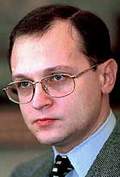On 23 Mar 1998, President El'cin fired the entire Cabinet of Viktor Černomyrdin on the pretext that economic reform was not dynamic enough. Initially, El'cin signed a decree naming himself acting prime minister (23 Mar 1998), but on the same day he named to that post virtually unknown Energy Minister Sergey Kirienko. Many expressed doubts about Kirienko's youth and inexperience and the State Duma rejected his candidacy twice on 10 Apr 1998 and 17 Apr 1998. Only after El'cin threatened to dissolve the legislature, did the Duma on 24 Apr 1998 confirm Kirienko on the third vote. El'cin officially appointed Kiriyenko prime minister on 24 Apr 1998. As the government dug itself deeper into a pit of indebtedness, wage arrears accumulated. Coal miners blocked sections of the Trans-Siberian railroad, effectively cutting the country in two and calling for the resignation of El'cin and his government. Kirienko struggled to put together a program of emergency measures to resolve the financial crisis, but the value of the ruble resumed its fall. On 17 Aug 1998, the government announced an effective devaluation of the ruble and the national currency promptly fell below the new "floor." The government imposed restrictions on foreign exchange operations, freezing trade in short-term government debt (treasury bills) and unilaterally announcing a restructuring of that debt. It also declared a 90-day moratorium on commercial foreign debt servicing. The ruble went into free fall as Russians sought frantically to buy dollars. Western creditors lost heavily. A large part of Russia's banking sector was destroyed, since many banks had large GKO holdings and the larger banks had substantial dollar borrowings. A week later, on 23 Aug 1998, El'cin fired Kiriyenko and declared his intention of returning Chernomyrdin to office. |

